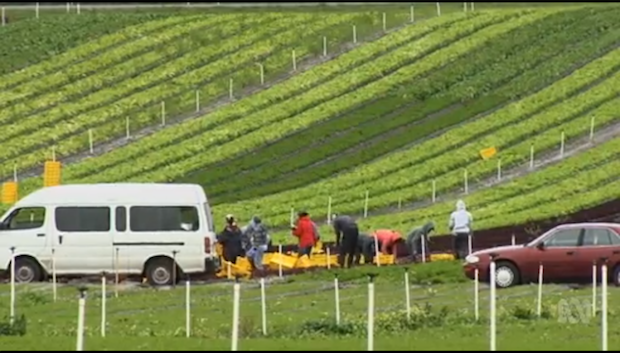Political moves already afoot to investigate allegations of widespread exploitation of foreign workers on temporary visas have been given new impetus by revelations of “slave labour” in the Australian fresh food supply chain.
An explosive investigation, aired on Four Corners last night, revealed that migrant workers on working holiday (417) visas are often denied pay and basic conditions, or underpaid and subjected to abuse, sexual assault and racism.
In March, the Abbott government voted against a broad-ranging senate inquiry into the treatment and impact of migrant workers which the Assistant Minister for Immigration, Michaelia Cash, dismissed as “politically motivated”.
Cash said the government would not support the motion, jointly passed with Greens and Labor backing, because it had been established by “those who are fundamentally opposed to the 457 skilled migration program”, a separate visa class for skilled short-term workers which the inquiry will also examine.
But Four Corners’ investigation reveals the grim reality of how labour hire contract businesses systematically abuse existing short-term temporary working visa arrangements, all of which are covered by the inquiry’s terms of reference.
The report detailed how workers are sometimes forced to work up to eighteen hours a day, often for half the award wage, and at least one case of a woman being paid just $3.95 per hour.
The workers, mostly engaged in seasonal harvesting or factory work, often have thousands or tens-of-thousands of dollars ‘skimmed’ off their wages by labour hire companies supplying major outlets like Coles, Woolworths and KFC.
A significant number of this “underclass” of workers do not have proper work visas, but most are just chronically underpaid and subjected to intimidation and abuse. The report is littered with allegations of extortion and sexual assault.

Three women who appear in the program describe being lured away to rooms, supposedly to collect their pay, before being sexually assaulted. One, who suffered a serious workplace injury days before, explained how the manager forced her onto his bed and pinned her wounded hand down so hard her stitches opened.
“I knew my hand was bleeding because I used all my strength to push him away…he put his hands into my clothes and touched my breasts,” the woman said.
Some of the women have been fired after reporting the abuse and Peter Hocking, from Bundaberg Fruit and Vegetable Growers, said there are reports of sexual extortion for visa extensions.
In another part of the program, two British backpackers wearing secret cameras explain to staff at the Bundaberg hostel, which arranged a fruit picking job for them, that they haven’t been paid. After a few minutes of confusion a hostel manager is heard to say, presumably to a labour hire contractor, “don’t bring any more European people here, okay”.
Reacting to the program, Greens Deputy Leader and Industrial Relations spokesman Adam Bandt said the report “adds to a large number of horror stories of overseas workers on visas in Australia being exploited and our minimum conditions not being enforced”.
He called on the government to investigate the reports immediately, and said the Greens had “initiated the landmark Senate inquiry into Australia’s working visa system precisely to work out how we stop this kind of exploitation”.
“The Senate inquiry will examine the impact of the current system on both overseas and local workers, wages and conditions for overseas workers as well as whether monitoring and enforcement of the working visa programs are adequate.”
But some of the companies featured in the Four Corners story have long been within the sights of the industrial relations watchdog, and other parts of the media too.
One company, Covino Farms, has been issued more than 30 improvement notices for breaches of workplace health and safety laws, as well as being fined for a number of environmental breaches.
Like most of the workplaces featured in the program, Covino Farms supplies major supermarkets.
Despite the company’s shonky track record, the Napthine government provided Covino Farms with a $1.5 million grant in late 2013, a move criticised by the Victorian Labor opposition.
“I understand that some of these allegations about poor workplace performance and bad environmental conduct by Covino Farms were raised with the minister and his electorate office staff directly prior to Covino Farms being given the $1.5 million grant,” Natalie Hutchins MP said.
“In addition, many unsafe work practices have been brought to the public’s attention through 24 visits from WorkSafe inspectors, and the company has been found to be in breach of a range of regulations.”
It’s this systematised abuse that is perhaps most striking about the Four Corners program. Across the sector there was apparently widespread awareness of issues of illegal, unpaid or underpaid, abusive and sexually exploitative workplace practices.
The National Union of Workers, the federal Nationals member for Hinkler, the Deputy Mayor of Swan Hill Rural Council, a Bundaberg growers’ group representative, at least one academic and multiple farmers were all aware of the serious difficulties faced by the migrant workforce in the towns that dot the harvesting trail.
The problem, according to the report, spreads across a range of states, including at least Victoria, South Australia and Queensland.
Last night Victoria’s newly appointed Industrial Relations Minister, Natalie Hutchins, reiterated the Andrews government’s promise to establish an inquiry “into labour hire, sham contracting and the unethical treatment of employees”.
“It's clear that Victoria needs a better system in place,” Hutchinson said, promising to “also advocate for a national response to what is a national shame”.
While the Australian Council of Trade Unions had welcomed the federal senate investigation primarily as a means of reducing the national reliance on foreign workers, it too acknowledges the “unacceptable levels of abuse and exploitation of temporary visa workers”.
Keith Pitt, the Nationals member for Hinkler, which includes the fruit-picking hub of Bundaberg, said undercover enforcement of labour laws was needed.
“My view is we need a multi-jurisdictional task force,” Pitt said.
“We need all levels of government to get together and to try and have a coordinated effort to crack down on this.”
Donate To New Matilda
New Matilda is a small, independent media outlet. We survive through reader contributions, and never losing a lawsuit. If you got something from this article, giving something back helps us to continue speaking truth to power. Every little bit counts.



